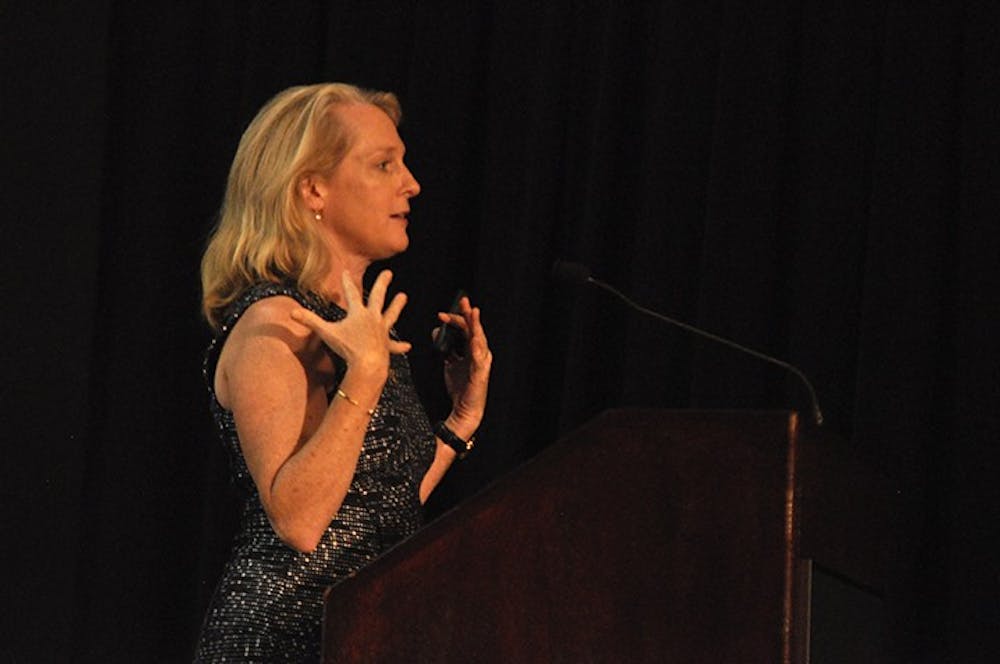Piper Kerman, memoirist and subject of Netflix's widely-watched series "Orange is the New Black" came to USC on Tuesday night and sat down with the Daily Gamecock and SGTV to talk about her book, time in prison and role with the show.
SGTV: How closely do the book and the show run?
Piper Kerman: They take the book, and they put it in a blender. They throw a lot of extra ingredients in, and they press liquefy, which means that there are all kinds of things from the book, but they pop up in different ways, whether it be a characterization, a setting or part of a storyline. In many ways its very different from the book, but the setting is true to life, and the heart and the soul of the show are the same as the book.
SGTV: How involved are you with the show?
PK: I'm a consultant on the show. That means that I answer questions. Jenji [Kohan] has questions, and there are eight writers on the show. When they're thinking about what a season will look like, they ask a lot of questions. I read the scripts and I send the feedback to Jenji, and it's hers to decide what to do with it. I try to keep my feedback focused on helping make Litchfield a real world.
SGTV: When did you plan to write a book about the experience?
PK: I came home from prison in 2005, and almost every person I knew wanted to know about the experience in as much detail as I was willing to share. The world of prisons and jails is very intentionally hidden away from the eyes of the public, and I think that is a mistake. Certainly, my own experience is very different than what I expected it to be, and it's very different than what is typically portrayed about prisons and prisoners. We have the biggest prison population in human history in the United States. We have the biggest prison population in the world, but also, there has never been a society that has incarcerated so many of its citizens. I think it's important for folks to think about those millions of Americans living behind bars.
Daily Gamecock: What is something you've gotten out of prison that you think everyone would be better off having experienced?
PK: I think that everyone should have a clear sense of inequality in this country. We are segregated in many ways in this society but especially by class. I think that people don't recognize that some Americans have tremendous wants in their life, whether that is a need for education, a need for healthcare, or many things that middle class people take for granted.
DG: You went to a women's college and a women's prison. Could you compare the two experiences in homosocial institutions?
PK: Those are two remarkable women's communities — one being an amazing place devoted to the most productive efforts of women to realize their fullest potential, one very different because prisons are all about punishment, and they really are not about helping people be their best selves, ironically, even though it's called 'corrections.' Yet, relationships are really important to women whether they're walking around in the free world or whether they're behind bars. Whether that's a friendship or a romance or the relationship with your child or a parent, those things are really primary when you are looking at life in a women's prison. I think I have a line in the book about, 'You sort of see the best and worst of women at a women's college and a women's prison.'
DG: Do you have any wise words for college students who are, like your book says, 'thirsting for a Bohemian lifestyle with no clear plan?'
PK: I think it's really important for all young people to recognize that it's totally natural and normal and, in fact, desirable for them to take risks. It's exactly what young people in their teens and twenties do, naturally. I think it's biological. But, it's really important to try and take productive risks, positive risks, as opposed to negative risks. You can do either — that's the really important choice that you have at a time of your life when you're experimenting and having adventures. It's important to remember that your own actions, not only do they have an impact on you and your immediate family, but they have an impact on the world. That's why thinking about taking positive risks is a great way to go about it, but it also says that young people shouldn't fear failure. Failures are what helps you stretch and grow and get better. If you're too cautious to fail then you'll never actually reach your full potential.
DG: Your husband does six-word memoirs. Do you have one?
PK: Mine is "In and out of hot water." That has always been true to me and continues to stay true.

